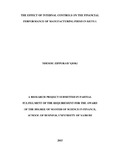| dc.description.abstract | The overall objective of this study was to establish the effects of internal controls on
the financial performance of manufacturing firms in Nairobi Kenya. This was
achieved by looking at the effect of control environment, risk assessment, information
and communication, control activities and monitoring on the return on asset of
manufacturing firms in Kenya. Descriptive statistics and inferential analysis of the
data were carried out using measures of central tendency and Pearson correlation
analysis. Secondary data collected from the manufacturing firm’s annual reports for
the period 2013 to 2014 was used in this study. The data collected from the annual
report was analyzed using the multiple regression analysis, which was obtained using
statistical package for social sciences. In the model, the dependent variable return on
asset was used as an indicator of financial performance while the independent
variables (control environment, risk assessment, information and communication,
control activities and monitoring) were used as internal control indicators. The
findings of the study showed that there is a significant relationship between internal
controls and financial performance. The dependent and the independent variables in
the study indicated a relationship with control environment, risk assessment,
information and communication and control activities showing a positive relationship
with the return on asset while monitoring showed a negative relationship with return
on asset. The study concluded that control environment, risk assessment, information
& communication, and control activities have a significant relationship with the return
on asset of manufacturing firms in Kenya. The study suggests that all manufacturing
firms in Kenya should implement internal control system. Manufacturing firms that
had invested on effective internal control systems had more improved financial
performance as compared to those manufacturing firms that had a weak internal
control system. The study further recommends that the governing body, possibly
supported by the audit committee, should ensure that the internal control system is
periodically monitored and evaluated. The limitation of this study is that the study
focused on 35 manufacturing firms only while we have more than 500 manufacturing
firms in Kenya, therefore these findings may not be used for generalizations on all
manufacturing firms in Kenya. It is therefore important for a study to be conducted
using wider scope and coverage then, the findings can be compared and conclusions
drawn. | en_US |

